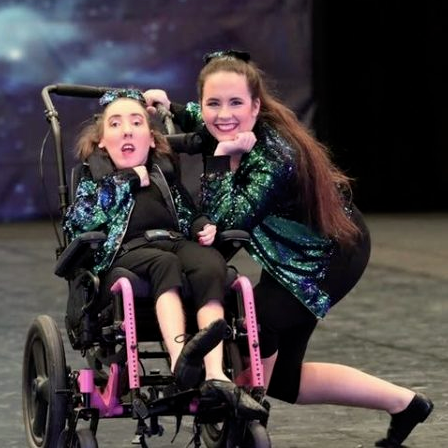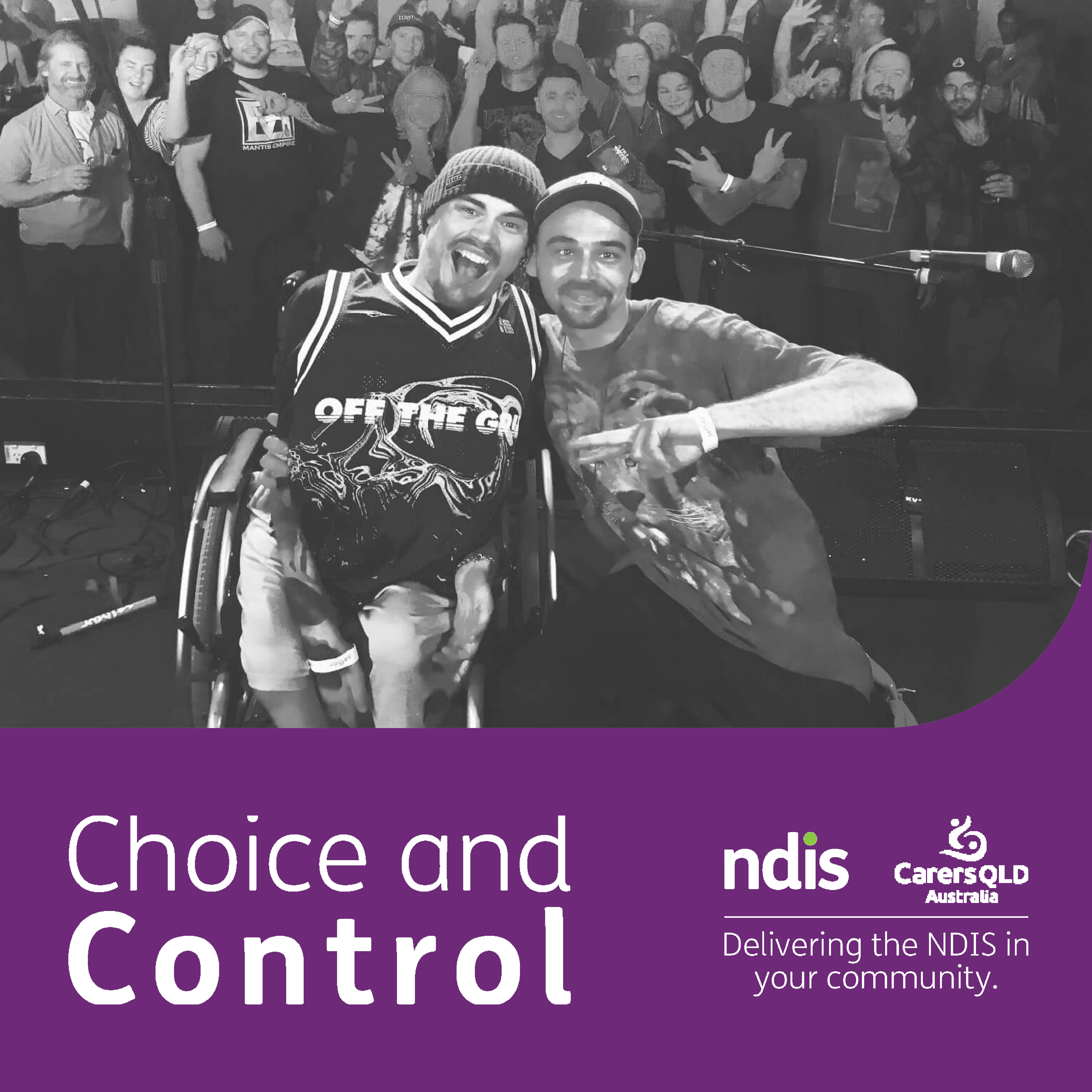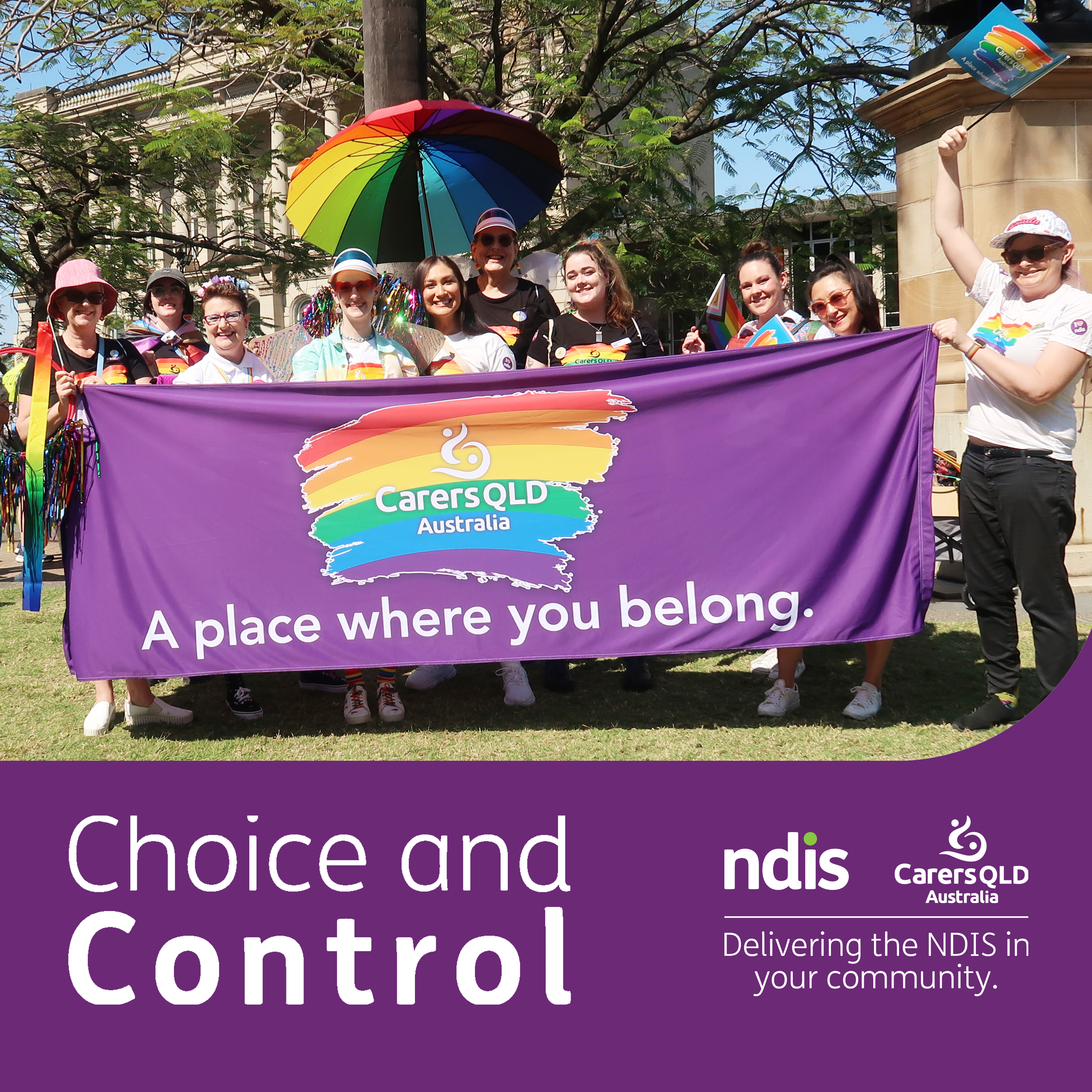Speaker 0 00:00:00 A C Connect. It's a new way to stay in touch with your local area coordinator, carers Queensland, with everything you need right here on your device. It's a handy app to keep track of your L AAC appointments, browse workshops and events, check out information and support, and get the latest news stories and podcasts. It's available on Android and iOS, so whatever device you have, you can stay in touch. Head to our website to sign
[email protected] au and look for Connect
Speaker 0 00:00:38 Joyce and Control a podcast celebrating people with disability. Brought to you by carers Queensland, N D I S, local area coordination partner in the community. The N D I S is here to help all Australians, but not everybody is comfortable working with places like government agencies. If you've experienced discrimination in that environment in the past, it's understandable you'd be reluctant to go there. Again. One of the groups who faced generations of discrimination in Australia are the lgbtq plus community to make sure our services are welcoming and accessible to everybody. Carers Queensland's now has a new way to get in touch. During World Pride celebrations, we launched a new email address, rainbow carers qld.com.au that connects you with a rainbow responder. They're carers, Queensland staff who are themselves Ltq Plus and can support your inquiry from a place of lived experience and compassion. To find out more about sitting at the intersection of the rainbow community and the disability community, we caught up for a chat with Tim Locklin, Tim's neuro divergent queer and uses a wheelchair. He says the new rainbow responders are a step in the right direction.
Speaker 2 00:01:55 The historically queer people, L G B T I, you know, there's always been a bit of distrust of, you know, sort of government departments because of the history. So I think moving forward it's essential that government departments, um, make it known that they are actively working to move away from that image and actually support people. And it's not a case of like segregation or anything, but making sure that people know that they have supports that aren't gonna be judgmental of, you know, intersectionality and making sure that people feel comfortable. Um, I guess mentioning that they might be in the same sex relationship or something when having their planning meetings. Something that is long overdue in, in making sure that queer people can feel safe and supported and good to see that we're moving in that direction.
Speaker 3 00:02:48 And have you seen that happening with the N D I A or even with Carers Queensland? So far?
Speaker 2 00:02:54 Sort of like what I've seen, it's, it's been positive. Like I'm not very in this space, like I'm a queer person, I'm disabled, but like, I'm not really in like the queer space too much. But from what I've seen in making those efforts to say that, you know, places are inclusive, that there's like genuine training going on for staff so they, you know, understand terminology, bits and pieces. I guess how to be supportive and understand how intersectionality can influence a person's life and the supports they might need.
Speaker 0 00:03:23 It's not just about awareness, but representation and lived experience as well. That means employing people with disability, people from different cultural backgrounds and people from across the l g BT i q plus spectrum something carers Queensland takes very seriously.
Speaker 2 00:03:40 Inclusion and, uh, you know, equity, we need to have more people with disabilities and queer people being employed. So that way, um, I guess the end users can see that the organization practice what it preaches and it employs, you know, people from these different intersectional groups. And from an end user point of view, if you can see somebody in the organization who resembles yourself, it makes you much more likely to, you know, trust that organization. It makes it easier to build rapport with the person who's helping out with your n I s stuff. So yeah, it's good that we've got, we've recognized that there is intersectionality in that we've got people with disability who are LGBT plus. Um, but also I think working with the LDI community in general, because, although I haven't been to many like pride events, but speaking to other disabled queer people who have been, they say a lot of those sort of events aren't accessible.
Speaker 2 00:04:36 So I think to have initiatives where we're making sure not only are we providing safe access routes to the N D I S for queer people, but also, um, making the community a bit more accessible and safe. So people who are disabled and queer can go into queer spaces and know that they can, you know, physically access the place and that they'll be welcome and not judged based on disabilities. So I, I'd like to see an effort where normalizing disability in queer spaces and creating means, whether it's through physical access or social change, to make sure that everyone can come together and celebrate their identity really with, um, anything in society regarding like social change. It's, it's not an overnight process. Um, I would say things are better than what they were five years ago, but yes, it's, it's still a slow process, but to know that we have, you know, now this, um, rainbow N D I S specific piece, that's a real good step in the right direction.
Speaker 2 00:05:37 Um, and then, you know, to broaden that out to work non-disabled community as well in the queer spaces to make sure that, um, pride events are accessible, inclusive, and all that. And also just like working with, um, L G BT organizations and stuff to ensure that they've got accessibility in bits and pieces. Cuz um, I guess from my experience, the biggest barrier to getting into any sort of like queer spaces is physical access if your disability is a physical one. Um, but also just I think awareness of like neurodiversity because I've seen that neurodiversity and being queer that's often they play into each other. A lot of queer people are neurodiverse. So I think having channels where people know that, you know, disability and L G B T understand that that's all part of what makes up a person and having places where people can go and feel welcome. Yeah,
Speaker 0 00:06:32 DI's just finished his qualifications as an occupational therapist. He's already been using his wheelchair motocross skills to teach other wheelchair users tricks to get around access barriers, like hopping over curbs, bringing together that professional knowledge and practical experience is the focus of Tim's plans now.
Speaker 2 00:06:50 My hopes, uh, to get into sports area of occupational therapy. So with my background in wheelchair skating, um, I taught myself how to script, um, skate chairs and I've taught myself how to manufacture them and stuff. So I've got like a fair amount of transferable skills in that space. So I feel it would best for me to move into sort of a sports space where I can help facilitate disabled p people participation in sports, um, whether they've got physical disability or um, cognitive neurodiverse. Um, really just using a combination of my lived experience and my clinical knowledge to make sure people can get out in their communities, stay active, participate and lead fun, healthy, active lives. So that's really my goal.
Speaker 3 00:07:39 That's great. Something for you to achieve this year and what have you been up to with your wheelchair, uh, skating at the moment?
Speaker 2 00:07:46 Yeah, yeah, I've, um, I'm in the process of organizing a few sort of clinics here and there. At the moment it's myself sort of working with things, but I'm hoping to, um, partner up with sporting wheelies. Um, we've had a bit of a chat with their CEO and she's quite keen to get some sort of wheelchair skills program going. So, um, just in the process of sort of drafting up what a program can look like and then I'll present that back to them and hopefully they'll be happy with it.
Speaker 3 00:08:11 That's excellent. You'll get a lot more people hearing about it too, because how do you get the word out there at the moment about your clinics?
Speaker 2 00:08:18 Just through social media really. So when I was finishing my degree, I didn't put too much energy, time and effort into promoting things. It was emotionally just like I sort of say, oh, I'm going to skate park this day, has like, you know, promotion thing of when I'm doing it. But now that I've got a bit more free time up my sleeve, I want to get into like planning things much more efficiently and I guess have a few more networks where I can promote it through I guess one note. And it's sort of like, um, shows a bit how the times have changed. So about like, I think it was 2018 or something, I tried to launch, um, an L G B T skate initiative. Oh wow. And that was like sort of based off the wheelchair skating thing I did, but I got a huge amount of backlash from it.
Speaker 2 00:09:06 So I unfortunately found out the hard way that a lot of the disability community isn't queer friendly. You know, I was receiving horrible messages saying, why don't you go back to just doing skate stuff? It's, this is for children, why are you indoctrinating people? Stuff like that. And now, um, I've been successful in making my clinics inclusive, so we've got queer people skating alongside allies and stuff, and it's much more like inclusive environment. And that's what I really pride myself on now is that my clinics, we can have queer people and non-queer people come together and we are just sharing the same sport and there's no more hate or anything. It's people are supportive of each other. So, uh, I guess that's really a testament to when you build something, they will come. So if you create a safe space for people and you get it out there to let them know that this is safe, you are welcome, we'll do our best to accommodate you and make sure that you can feel like you can participate regardless of your background.
Speaker 2 00:10:03 And that's, I think what people need to know is that those safe spaces exist. And when you find your community, that that's really when things start opening up for you as you realize that there might be a small percentage of people who don't agree with what you do because of your sexual identity or your background or something. But at the end of the day, finding people who support you, that's what really matters because that's why I have hope for the future. And you know, saying that five years ago things weren't as good as they are. So hopefully another five, 10 years, I hope that I could potentially start up another offshoot where we have queer specific classes. But yeah, for now, I'm just happy that we're at a point where everyone can come together regardless of background and just enjoy a common sport together.
Speaker 0 00:10:54 That's occupational therapist and wheelchair motocross Rider and fabricator Tim Locklin car's. Queensland's new email address is rainbow carers qld.com.au to contact one of our rainbow responders to support you from a place of safety experience, an understanding. Thanks for joining us at Choice and Control, a Carers Queensland podcast. For more information about the National Disability Insurance Scheme or carers Queensland, contact us
[email protected]. You can call us on one 300 triple 9 6 3 6 or head to Facebook and look for carers Queensland and d i s.


